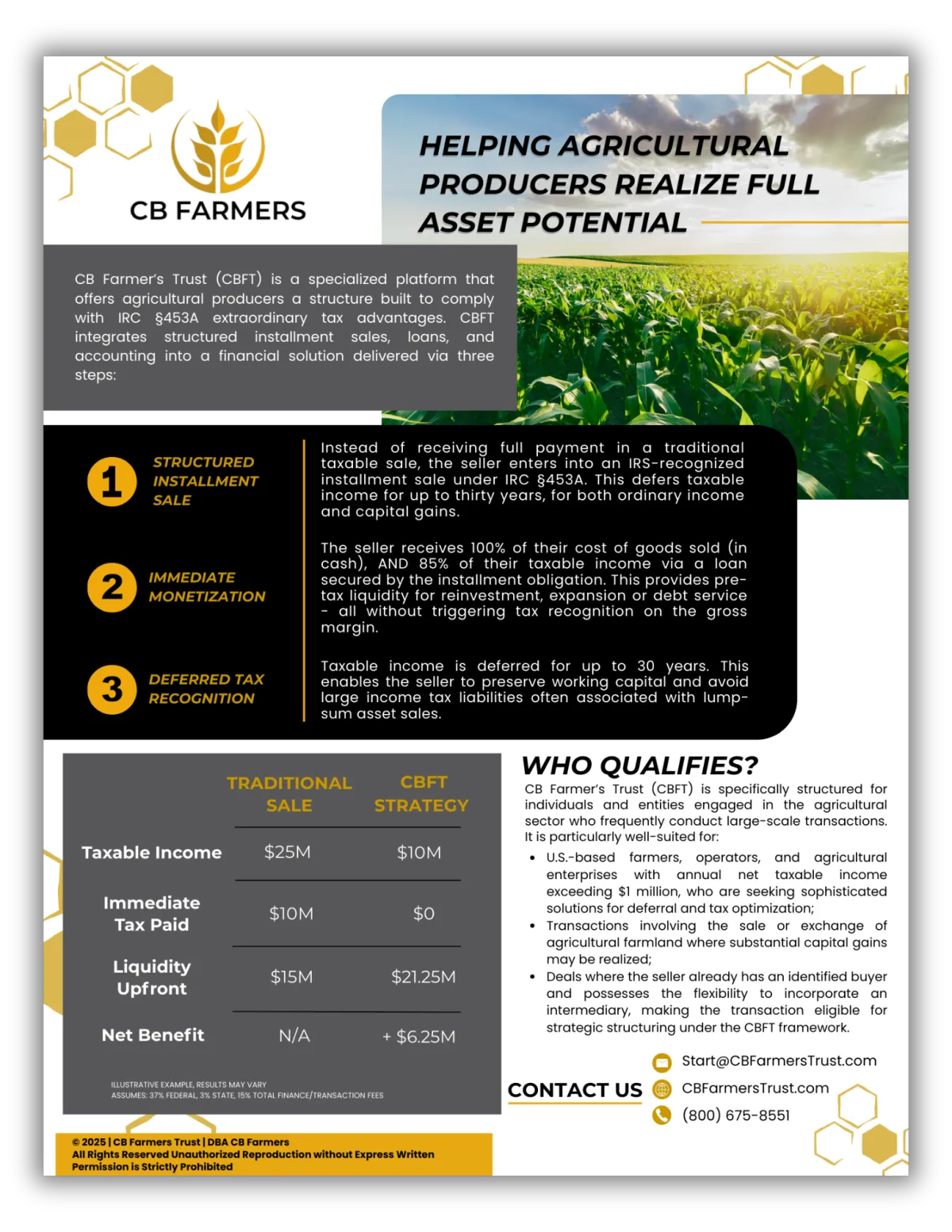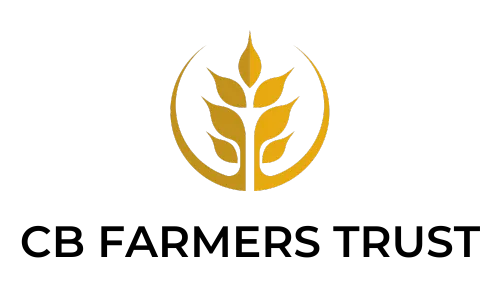CB Farmers Trust
A tax-efficient harvest program that lets farmers defer income taxes and reinvest earnings, season after season.
Get the CB Farmers Guide!
Learn more about the benefits of using the FIST program

How This Works
What is a Farmer's Installment Sale Trust (FIST)?
A Farmers Installment Sale Trust (FIST) is a financial transaction where a farmer sells the harvest to an intermediary trust which then funds the next season's seeds.
Created to give farmers a tax break. This method defers the tax on the harvest or crop legally and is entirely IRS approved, and has been in use for decades by larger farms.
We use the installment sale and value of farm and real property under I.R.C. § 453, Publication 537, and I.R.C. § 2032A(e)(5).

Why Use a Farmer's Installment Sale Trust (FIST)?
You can defer the tax hit for 30 years.
Why is this a big deal?
Instead of paying a big chunk of money to the IRS, you keep that cash in your in your farm, where it pays for next season.
Also, $1 today is a lot more expensive than $1 in 30 years. How much was your dollar worth in 1990 compared to today?
Now, since the tax is paying for next season, you have two options:
Further expand your farm with your additional money.
Stay the same size and take a bigger profit.
What does the IRS Say About This?
Let's break this down. Farmer's Installment Sale Trust (FIST) is a special rule that can help you save money on taxes, but it's only for farming-related transactions.
According to I.R.C. § 2032A(e)(5), "farming" can mean a lot of things, like raising animals, growing fruits, or even harvesting timber. "Farming purposes" are the specific things you do on a farm, like growing crops or storing them before they get turned into something else.
Now, it's super important to play by the IRS rules. For example, let's say you've got a big container of soybeans. If you sell those using a Farmer's IST, you could delay paying taxes on that money for up to 30 years. But hold on—if you process those soybeans, they're considered "manufactured," and then you can't use the Farmer's IST program.
Additionally, if you've got equipment on your farm that's lost some of its value over time (like an irrigation system), you now owe taxes on depreciation. With a Farmer's Installment Sale Trust, you can defer the taxes paid to depreciation recapture. Basically, the IRS says, "We let you defer the payment of those taxes for up to 30 years."

What is NOT allowed for a Monetized Installment Sale?
With backlash about the Monetized Installment Sale, we need to address the elephant in the room.
The IRS issued regulations that identify certain Monetized Installment Sales as "listed transactions." These certain sales include, only non-agricultural-related;
- Property
- Appreciate Assets
- Business Transactions
Basically, the IRS wants everyone to pay the taxes they owed when abusing the Monetized Installment Sale for stuff other than farm-related goods. These are considered abusive tax transactions that must be reported to the IRS.
So, bottom line: IRS code 453(b) specifically states agriculture land and produce are the only assets allowed to be sold utilizing this type of installment sale. Make sure you know what counts and what doesn't, so you can best plan around taxes.
If you are looking to sell a highly appreciated asset like a business or property, check out the Installment Sale Trust. This financial vehicle is also IRS-accepted.

Frequently Asked Questions
Has something like this ever been done before?
Yes. Congress first passed legislation for deferred sales in 1921 with changes and updates over time including those in 1980. Large timber companies have utilized a similar approach numerous times for the sale of large tracts of timber land. The IRS provided the guideline in its 2012 IRS Memorandum.
Does this approach include just land sales or can it include crops and livestock?
Yes. Land sales and “handling, drying, packing, grading, or storing on a farm any agricultural or horticultural commodity in its un-manufactured state; and the planting, cultivating, caring for, or cutting of trees, or the preparation (other than milling) of trees for market” are included.
However, depreciated assets cannot be included in the FIST. Depreciated assets include center pivot irrigation systems, buildings, machinery or drainage tile, as examples. We use an Installment Sale Trust or IST for those assets, same benefits minus the monetized portion. Feel free to ask us more about IST.
Do I have to be an active farmer or rancher to use FIST?
No, you don't need to be actively involved in farming to use FIST. Owners of farm or ranch land who aren't farmers or ranchers can utilize FIST, such as siblings that jointly own a farm even though none of them are actively involved in farming. The key element to FIST participation is that the land is for farming or ranching and the grain or livestock is in an un-manufactured state (in other words raw grain and live farm animals).
I’m retiring from farming and want to 'sell everything', can I use this approach?
Yes. As long as your farm is classified as agriculture under IRS guidelines (see above) you can implement the Farmer’s Installment Sale Trust (FIST) for up to 30 years! The grain, livestock and farm land can be sold and the tax dollars deferred. This includes ordinary income and capital gains taxes. The key part of FIST is that you will receive up to 99% of the total net sale in the form of a simple interest loan. In some cases an Installment Sale Trust (IST) may be a better option. Asks for an evaluation and IST Proforma Report.
If it’s been done before why haven’t I heard of it?
Fortune 500 timber companies have accomplished it with the help of large banks, Big 4 accounting firms and large legal practices. CB Farmers Trust has developed the FIST that can be used by farmers…bringing Fortune 500 value to agriculture!
I am not in the timber business…I’m a farmer, how does it work for me?
Timber land and produce or harvest is classified within the USDA and defined in the 2012 IRS Memorandum, Section 2032A(e)(4) states the term ‘farm’ includes “livestock, dairy, poultry, fruit, fur bearing animals, and truck farms, plantations, ranches, nurseries, ranges, greenhouses, orchards, and woodlands.” Farms and farmland are actually at the core of the IRS’s perspective.
Should I get my CPA or tax attorney involved in the process?
Definitely. We require your CPA or tax attorney participation before any contracts are signed. Our approach is a powerful tool for your financial future and the involvement of your key financial advisor(s) is crucial. CB Farmers Trust does not provide tax advice or counseling. CB Farmers Trust is not a bank, intermediary, fiduciary nor an investment firm. CB Farmers Trust IST is a 3rd party (substitute) obligor in the process.
What can I do with the cash (loan)?
As part of the FIST process, you can receive up to 99% of the net sale in cash (as a loan). You are not limited in what you can do with the cash. However, we suggest that you work with your CPA and/or financial advisor to develop a plan to grow the funds received so that it can grow (compound growth) over time.
Can I stagger the maturity dates within the same transaction?
Yes, as long as the amount totals exceeds the $1M minimum. Staggering several maturity dates within one transaction allows flexibility in your future financial planning.
Will I ever have to actually pay taxes on the sale?
Yes. All applicable taxes will be due in the year of deferral end, at the tax rates at that time. Most notes are for 30 years.
If I eventually have to pay taxes, why even go through the effort?
The Farmers Installment Sale Trust (FIST) enables you to reinvest in your future. Instead of paying taxes today, reinvesting in your operation enables you to fund future growth, today. When the term is mature, revenue will be recognized and taxes will be due. However, you have had years to put that money to your operation’s benefit.
Why is there a $1M minimum transaction amount?
The costs associated with the loan structure requires a minimum transaction to provide the necessary financial provisions.
In the case of real estate, why not do a 1031 Exchange instead of the Farmers Installment Sale trust (FIST), which is better?
Which one is better for you depends upon your situation! A 1031 Exchange is a 'like for like’ with many other rules to comply with, while FIST provides cash (as a loan) with a tax deferral. 1031 Exchanges also have tight time frames to identify and execute transactions on another property. FIST allows you to sell you farm or Ag Land, defer the taxes and then invest in another farm or other investments, if that is your plan. Transactions or timelines that would never qualify under the onerous 1031 Exchange Rules. You can wait a year or two or more to identify the farm, or other investment, that is right for you and your situation with the loan dollars. With the FIST, you are in command of the decision process.
Get Started With CB Farmer's Trust!
It's a simple, quick process. Meet with us to see how CB Farmer's Trust can help your Ag business!
dba: CB Farmers
CB Administrative Services, LLC, TTEE
10080 N Wolfe Road Ste SW3-200CBAS Cupertino, CA 95014
Nothing on this site should be interpreted to state or imply that past results are an indication of future performance. This site does not constitute a complete description of our investment services and is for informational purposes only. It is in no way a solicitation or an offer to sell insurance, annuities, securities or investment advisory services except, where applicable, in states where we are registered or where an exemption or exclusion from such registration or licensing exists. Information throughout this internet site, whether stock quotes, charts, articles, or any other statements regarding market or other financial information, is obtained from sources which we, and our suppliers believe reliable, but we do not warrant or guarantee the timeliness or accuracy of this information. Neither our information providers nor we shall be liable for any errors or inaccuracies, regardless of cause, or the lack of timeliness of, or for any delay or interruption in the transmission thereof to the user. All investments involve risk, including foreign currency exchange rates, political risks, different methods of accounting and financial reporting, and foreign taxes.
